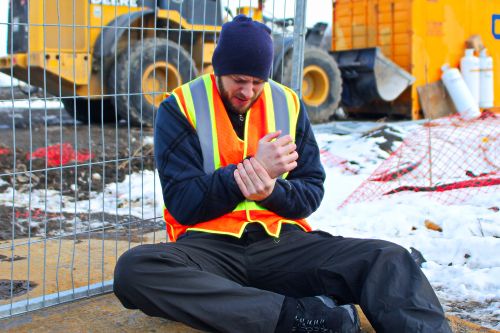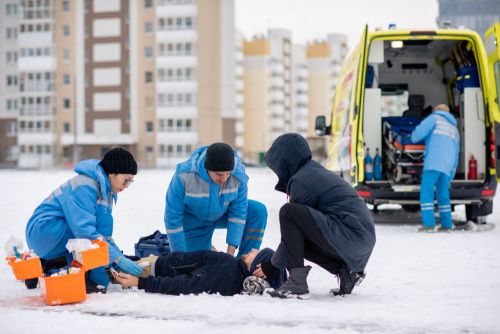Winter-Specific First Aid: Preparing Construction Site Medical Kits for Cold Weather
Construction sites are active work environments, thus employee safety is of utmost importance. Although construction site medical kits are a typical component of this work, they need to be specially prepared for cold weather. These kits are essential not just for providing rapid first aid but also for preserving the health and productivity of your staff in harsh winter climates.
In this blog, the team at Advanced CT will examine the crucial factors to take into account while setting up construction site medical kits for cold weather.
Cold-Related Injuries

Risks associated with the cold, such as hypothermia and frostbite, can be serious. When the body loses heat more quickly than it can create it, it experiences hypothermia, which causes the body temperature to dip dangerously low. Frostbite, which causes bodily tissue to freeze, typically affects the fingers and toes. Include products like fast hand warmers, thermal blankets, and additional warm clothing like gloves, hats, and socks in the construction site medical kits to mitigate these dangers.
Accidental Falls and Slips
Construction sites sometimes have ice or slippery surfaces during cold weather. Injury from falls and slips is more likely to happen to workers. Make sure your construction site medical kits have items for treating wounds, including adhesive bandages for covering cuts and abrasions, gauze for bigger wounds, antiseptic wipes for cleaning wounds, and ice packs for lowering swelling in the event of injuries.
Respiratory Issues
Construction workers who operate in extremely low temperatures may experience breathing issues. If there are airborne irritants present, they can make cold air even more damaging to the lungs. For defence against chilly air and probable airborne irritants, it is essential to include dust masks or respirators in the construction site medical kits.
Sprained and Strained Muscles
Since muscles are less flexible in lower temperatures, the risk of muscular injuries might rise during cold weather. In order to deal with this, enhance your medical bag with pain medicines (such as ibuprofen), elastic bandages (for wrapping and supporting strained muscles), and heat packs. Heat packs can relieve wounded employees by easing their discomfort and reducing muscular stiffness.
Dehydration
It’s crucial to keep hydrated, even in chilly temperatures. In chilly weather, workers might not feel as thirsty, but dehydration is still a possibility. Include electrolyte pills and water bottles in your pack. Electrolyte pills can assist in replacing vital minerals lost due to perspiration.
Communication
Communication might be difficult at construction sites that are far away or covered in snow. Make sure you have two-way radios and/or functional mobile phones with charged batteries on hand in case of emergency. When aid is required immediately in cold weather conditions, reliable communication might be a lifesaver.
Warmth and Shelter
It is essential to have preparations for warmth and shelter during severe weather. Include supplies like space blankets, temporary shelters, and emergency sleeping bags in the medical kit. These can save lives in situations where employees need protection from very low temperatures or unplanned overnight stays due to bad weather.
Eye Protection
It’s crucial to offer eye protection whenever employees are exposed to snow or strong sunshine, especially when both circumstances are reflected. Snow may make the sun’s glare worse, which can damage the eyes. Include safety goggles or sunglasses in your toolkit to shield employees’ eyes from harm.
Automated External Defibrillators (AEDs)

Consider having an Automated External Defibrillator (AED) on-site in case of cardiac crises depending on the size and nature of the building site. Having access to an AED might be a vital lifesaving step since the cold temperature can strain the cardiovascular system even more.
Check and Rotate Supplies
Make sure to regularly check and maintain the medical kit to make sure all of the supplies are intact and up to date. Immediately replace any worn or expired materials. To ensure that the kit is always fully supplied and prepared for usage, this maintenance should be planned and recorded.
Advanced CT – Leaders in Occupational Health & Safety
It is impossible to stress the importance of construction site medical kits for maintaining worker safety. In chilly weather, they are your first line of defence against the unforeseen. Setting the preparation and upkeep of these kits as a top priority will not only protect your workers but will also foster a culture of safety that will benefit your construction projects in the long run. Because of their thoughtful planning and well-equipped construction site medical kits, your construction site will be prepared to handle the obstacles when the weather turns cold and the snow starts to fall.
Please contact us when you are looking to prepare your construction team for winter conditions. At Advanced CT, we are acutely aware of the critical role that safety plays on building sites, particularly when adverse weather conditions are present. Our extensive health and safety training courses are created to provide your staff with the information and abilities they need to face problems in cold weather with assurance. Don’t rely on luck to keep you safe. Partner with Advanced CT to make sure your staff is ready for any circumstance. Let us assist you in improving the safety procedures on your building site.

